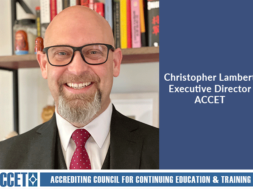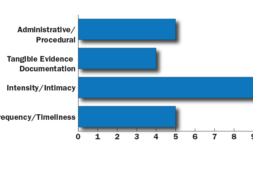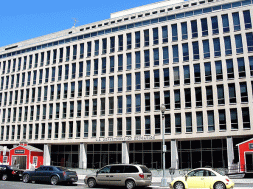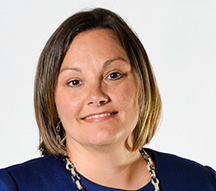
Edwards: ACICS Continues to Operate as a Fully Functioning Accrediting Agency
Interview with Michelle Edwards, President and CEO, Accrediting Council for Independent Colleges and Schools
Q: Tell us a little about your background?
A: I have been engaged in postsecondary education since 2008 most recently serving as Chief Academic and Compliance Officer, member of the Board of Directors, and Corporate Secretary for Delta School of Business & Technology (Delta Tech) in Lake Charles, LA. ACICS has been the accreditor for Delta Tech, and in that capacity, I worked with the organization on several fronts. Peer review is an essential component of the accreditation process, and in that role, I served on over 50 on-site evaluation team visits for ACICS, participated on their Intermediate Review Committee, and served on the Council/Board of Directors; most recently in the role of Chair. During the same time period I served on the board of directors for the Louisiana Association of Private Colleges and Schools; have been a part of the Junior League of Lake Charles for the past 10 years, including the role of President; and held board positions with Campfire USA of Southwest Louisiana; Leadership Southwest Louisiana; and the Literacy Council of Southwest Louisiana. Prior to entering the education field, I worked in various companies as a corporate trainer. I earned both bachelors and master’s degrees in Business Administration from Saint Leo University in Saint Leo, Florida.
Q: In July 2017 you became president and CEO of ACICS, what made you decide to apply for the position?
A: While at Delta Tech, I became interested in accreditation and how it impacts an institution and its students. Ultimately, accreditation is about ensuring quality standards, both in terms of academic quality and performance and financial operations. I served as the on-site administrator at Delta Tech responsible for ensuring that all areas of regulatory and accreditation compliance were continually met. Later I became a peer evaluator with ACICS, team chair, member of various committees, and ultimately a member of the board of directors. It was through these roles that I could see the importance of accreditation, both for the institutions and students.
I came to know that accreditation was my passion and how important it is to have a rigorous and meaningful accreditation process.
Through my work at Delta Tech, I developed a thorough understanding of ACICS’ Accreditation Criteria and most importantly their impact on member institutions and the students they serve. In my new role as president and CEO of ACICS, I want to do everything I can to support the ongoing strength of the organization and the accreditation process. I have been an active participant in the transformation of this agency to this point, and I recognize that we have much more work to do. I was ready to jump in and am inspired by being part of this vital process.
Q: You have launched some reforms in the last year. Can you talk a little about them and why you made the changes?
A: ACICS has made significant reforms in the past year in response to concerns raised by the National Advisory Committee and the Secretary of Education in June of 2016.
ACICS has strengthened its governance practices to support the integrity of the accreditation process and decision-making.
- ACICS has made a number of significant changes to strengthen its governance over the past year, including significant changes to staff leadership and the membership of the Council. Developing strong board and staff leadership has been essential in shepherding through the many reforms ACICS has instituted during the past year.
- At the August 2016 meeting, the Council’s first order of business was to vote to amend Article IV of the bylaws so that voting for commissioners is apportioned by the main campus only, rather than combined main and branch campuses under common ownership. Accordingly, the electoral influence of the broader membership that includes small institutions is more fairly distributed.
- At its December 2016 meeting, the Council voted to double the minimum number of public members on the commission from three to six members. Seven of 15 members of the Council currently represent the public.
- In July 2017, ACICS announced my appointment as the organization’s new president and CEO.
- ACICS continues to approach its obligations as if it were still recognized by the Department. This includes on-going attention to the recognition criteria, consistent enforcement of the ACICS Criteria and reporting requirements.
- The ACICS leadership has taken its oversight responsibilities to accredited institutions and their students seriously. ACICS continues to accredit 226 institutions with 515 main and branch campuses throughout the United States and abroad. ACICS continues to be recognized by the Council on Higher Education Accreditation (CHEA).
ACICS has adopted and aggressively implemented new Accreditation Criteria to improve the effectiveness of its accreditation process, with particular emphasis on student outcomes.
- ACICS has fundamentally changed its student outcomes assessment criteria and evaluation process.
- A revised definition of placement expressly requires employment that is in the field of study or a credential that directly benefits a graduate’s existing employment.
- ACICS has narrowed the scope of its accreditation activities so that resources can be appropriately concentrated on improving the performance of existing accredited institutions through strengthened oversight. ACICS has not accepted any new applications for initial accreditation since June of 2016. Further, it has placed a moratorium on programs above the master’s degree level, requiring the 10 currently accredited institutions offering doctoral-level programs to find an alternate accreditor or teach out all current enrollees no later than Dec. 31, 2019.
- ACICS has strengthened its interim monitoring mechanisms, with dedicated staff resources paying careful attention to information that indicates that an institution is not meeting the standards.
ACICS has established and implemented more robust standards, overhauling the architecture for collecting and verifying data, and implementing interim monitoring procedures.
- Established standards and benchmarks for retention, placement, and licensure are being systematically enforced, with a range of actions taken at both the program and campus levels. Institutions and programs whose rates fall below the standards are subject to sanctions.
- Beginning in 2018, all campuses will be required to complete an updated Quarterly Accountability Report in addition to the annual Campus Accountability Report, with data on retention, graduation, placement, and licensure for all programs. The purpose of the quarterly report is to enhance the focus on results essential to continuous improvement for the institutions and the Council in order to allow for the earlier detection of downward trends.
ACICS has overhauled and strengthened its monitoring approaches to identify and report problems with continued compliance.
- ACICS has developed multiple monitoring and evaluation approaches that enable the Council to identify problems with an institution’s or a program’s continued compliance with its standards. These approaches include the requirement for more timely and informative periodic reports and analysis of data as exemplified by indicators of student achievement.
- Through its At-Risk Institutions’ Group (ARIG), complaints and potentially adverse external information from various stakeholders are subject to more detailed investigations, including an on-site visit or a show-cause directive.
- ACICS has strengthened its monitoring of financial stability, which is reviewed periodically and on an ad hoc basis throughout the accreditation process. All institutions must submit an Annual Financial Report, including a balance sheet and income statement for each campus, which is verified by ACICS staff and members of the Financial Review Committee in order to assess financial stability and compliance with other requirements, including Title IV compliance audits.
- The Council monitors Cohort Default Rates and applies that information in evaluating financial stability. Institutions with rates higher than federal standards are subject to additional monitoring and reporting.
- ACICS monitors the number of substantive change requests made by an institution in a one-year time frame to determine the scope and impact on the overall operation. All substantive changes require Council approval before being included in the institution’s scope of accreditation. Additionally, the Executive Committee now reviews substantive changes alongside information concerning the campus’s student achievement outcomes, financial position, cohort default rate, enrollment data, complaints/other negative information, and overall compliance track record prior to any decision-making.
ACICS has strengthened its standards to be clear that institutions must come into compliance with the Council’s standards within specified time frames or accreditation will be withdrawn. ACICS has taken prompt action to withdraw accreditation from institutions that have failed to meet its standards.
- If the Council determines that an institution is not in compliance with the Accreditation Criteria, it will take prompt adverse action against the institution, or it will require the institution to take appropriate action to bring itself into compliance within a time frame specified by the Council, which will not exceed and may be less than the following:
a) twelve months, if the longest program is less than one year in length;
b) eighteen months, if the longest program is at least one year, but less than two years in length; and
c) two years, if the longest program is at least two years in length. - There have been at least three instances in the past year in which the Council has found institutions to be significantly out of compliance with ACICS standards, warranting immediate adverse action. These actions have been reported to the Department and published on the ACICS website. ACICS’s record of enforcing its standards by issuing compliance warnings, show cause directives, and withdrawing institutional accreditation and program approvals over the past year demonstrates that it has heightened the rigor of its accreditation process.
Q: You submitted a formal petition for recognition as a national accreditor and asked to be included on the agenda for the spring 2018 NACIQI meeting. Have you heard back from the Department of Education?
A: ACICS has been notified by the Department of Education (the Department) that our petition for initial recognition has been received and a staff analyst has been assigned to review it. The department has been provided a calendar of all accreditation activities for the remainder of 2017, and we anticipate that department staff will observe evaluation visits and decision-making meetings as part of the review of our agency’s petition.
Q: What happens next if the Department of Education does or does not accept your petition?
A: That is the million dollar question. ACICS has submitted a full petition for initial recognition demonstrating compliance with all of the recognition criteria. While we will be a much smaller organization by June 2018, we are hopeful that our member institutions will recognize the value of all the reforms we have implemented and maintain ACICS accreditation. Keep in mind that parallel to the petition with the department, the Administrative Procedures Act litigation against the department is still active, as we await summary judgment.
Should our petition not be successful, there are still possible paths forward for ACICS that the Council/Board of Directors is currently considering.
Q: Has the new administration been receptive to ACICS?
A: We have had many good communications with the Department concerning our petition for initial recognition. We expect the Department’s review process to be rigorous.
Q: What are ACICS’s short-term and long-term goals?
A: Short-term, we are absolutely focused on maintaining and enhancing the quality of the accreditation process in order to better serve our institutions and their students. Long-term, our goal is to regain our recognition as an accreditor and, looking to the future, to be a leader in the field when it comes to innovative, meaningful accreditation programs.
Q: Are there lessons learned that you would like to share with your peers?
A: I learn new lessons every day. But I think the most important lesson for our field is to recognize that accreditation must be meaningful and effective in order to work. Conversely, we must do a better job of explaining how accreditation works – the benefits of the process and, of course, the limitations.
Q: What can our readers do to help ACICS? Are there commissioner openings, site visits, team chairs, other?
A: ACICS continues to operate as a fully functioning accrediting agency, even after the loss of recognition from the department. We are still conducting accrediting activities to include evaluation visits and always welcome volunteers to serve as part of the peer review process with our organization.
MICHELLE EDWARDS joined the Accrediting Council for Independent Colleges and Schools (ACICS) as the President and CEO in July 2017. Prior to her appointment she served on over 50 on-site evaluation team visits for ACICS, participated on their Intermediate Review Committee, and served on the Council/Board of Directors; most recently in the role of Chair. Edwards has been engaged in post-secondary education since 2008 most recently serving as Chief Academic and Compliance Officer, member of the Board of Directors, and Corporate Secretary for Delta School of Business & Technology (Delta Tech) in Lake Charles, LA. During the same time period she served on the board of directors for the Louisiana Association of Private Colleges and Schools; has been a member of the Junior League of Lake Charles for the past 10 years, operating in several board seats, including the role of President; and held board positions with Campfire USA of Southwest Louisiana; Leadership Southwest Louisiana; and the Literacy Council of Southwest Louisiana. Prior to entering proprietary education, Edwards worked in various companies in the roles of management and corporate training. She earned both bachelors and master’s degrees in Business Administration from Saint Leo University in Saint Leo, Florida.
Contact Information: Ms. Michelle Edwards // President and CEO //ACICS // 202-336-6780 // medwards@acics.org // http://www.acics.org/default.aspx











